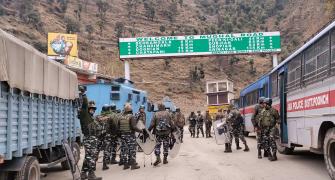Former Pakistan prime minister Benazir Bhutto is eyeing several key posts in the proposed interim set up to conduct general elections in the country.
A caretaker prime minister, three provincial chief ministers and nearly 30 ministers in their Cabinets are to be appointed by President Pervez Musharraf to supervise the upcoming parliamentary polls.
Media reports quoted Pakistan People's Party sources as saying that the primary attention of Bhutto was getting nominated by her representatives in the Punjab and Sindh provinces because these two would play a decisive role in the formation of the federal and two provincial governments after the elections.
In the first round of talks with the government, the PPP demanded that the government conduct elections within two months.
National Security Advisor Tariq Aziz led the government side while Makhdoom Amin Fahim and Rehman Malik represented the PPP.
The PPP asked the government to dissolve the present assemblies this month itself and demanded that elections be held within 60 days instead of 90 days from the dissolution of assemblies.
In a calculated move the PPP leader named Punjab and Sindh Chief Ministers -- Chaudhry Pervez Elahi and Dr Arbab Ghulam Rahim -- among those behind the attack on her homecoming procession.
This would put them under pressure and if she would be able to get them replaced, she may have a remarkable advantage in the elections, The News quoted sources as saying.
The presidential camp's consultations for appointment of caretakers are so far confined to the Chaudhry Shujaat Hussain-led Pakistan Muslim League and the PPP. However, it is widely believed that the PML would have a large sway in these nominations.
Maulana Fazlur Rehman is also likely to be partially consulted in this connection.
The first appointment of a caretaker chief minister, Shamsul Mulk, for the North West Frontier Province has gone relatively well at the political level.
An official said Musharraf will not try to nominate any controversial or highly politicised person as caretaker prime minister or chief minister as it may cause fingers being pointed at the electoral process itself.







